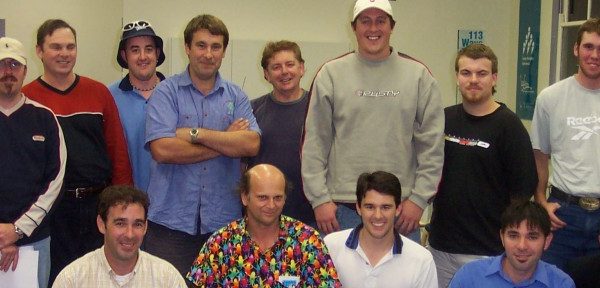Nido Early School professionals speak out in honour of International Men’s Day

Cal Zwart, the Executive Service Manager from Nido Early School QV1 in Perth, and Kaiwen Cai, an Educator from Nido Early School Southern River, have spoken out in honour of International Men’s Day, which was celebrated on Sunday 19 November.
Both men chose to speak out on International Men’s Day to talk about the positive impact male educators have in the early childhood education and care (ECEC) sector, the current stigma in society about men working in the sector, and how it feels to be a male educator in a female-dominated space.
Mr Zwart has been working in ECEC for over 15 years, while Mr Cai is newer to the profession, working in ECEC for just two years.
“I chose this job because of my life experience. When I was younger, I used to look after younger family members – my cousins,” Mr Cai said.
“I really enjoyed the experience of being with children younger than myself. That’s why I chose this career. I studied, did a traineeship with Nido and continued working for Nido. Since then, I’ve had the chance to care for and educate children who have moved from nursery to kinder. To see them growing and learning, and be part of that process feels incredibly special, and I am enormously proud of myself.”
Mr Zwart’s story has been a little different.
“I just fell into the sector,” he said.
“I was at uni, studying something unrelated. I was doing environmental science, community science and sustainability but needed a bit of a break. One of my friends at uni owned a small childcare centre and she offered me a job to keep me going through my break and I thought, why not?”
While he originally planned to stay for a term and go back to his studies “the next thing I know, it’s eleven years later and I joined Nido. I was in a few different roles; educator, lead educator, cook and manager of the service. It felt natural to me as my career choice – I think it was fate.”
Men bringing a point of difference
For Mr Zwart, his first ECEC role was in an area where there were a number of economically vulnerable families, many of which were headed up by single mothers, and positive male role models were thin on the ground.
“Having that obvious male presence in the children’s lives is a great benefit,” he said, “but I personally feel that other than that, I don’t feel a male Educator offers anything different to that of a female. Everyone has something different to offer in terms of their personalities, but I don’t think I have anything more to offer just because I am a male. It’s not gender specific. It’s just the right person for the right role.”
Tackling bias out loud
Unfortunately there are pervasive biases in society about children’s play, appearance and behaviour that are presented along gendered lines.
Each of the men were asked about their experiences of these stereotypes in the course of their work, and about what can be done to break down these biases in the course of their work with children.
“It’s definitely been part of my experience,” Mr Cai said.
“We have a boy who loves wearing a princess dress, as he’s always saying he wants to be a beautiful princess like his sisters. We have children saying he can’t wear it as boys don’t wear pink princess dresses. I’m always trying to teach children that everybody is different, they can choose the thing they’re interested in – boys can wear pink dresses and they should not feel bad about it.”
“When things like this happen, in my experience, it’s helpful to have a male educator in the team, as boys are often more likely to open up to me if they feel worried and are usually shy to address an issue with a female educator. I can see our families and other members of the team appreciate that.”
For Mr Zwart, being consistent in promoting diversity and inclusion has been important, and he advocates for having inclusive conversations with children from an early age.
“I am passionate about children’s literature and the latest book we sourced at our early school is a book called “Are you a boy or a girl?.” It’s about a girl wanting to play soccer, which has typically been perceived as a more male thing, because it’s a sport, and a boy wanting to do painting, which has been perceived in the past as a more female hobby,” he explained.
“So, embedding you can do either, whether you’re a boy or a girl, from an early age is the key. It’s also about reminding adults of this, as we tend to forget.”
“Every time that you say something in front of the children, they copy our actions and words. Things like “Cal, there’s a spider, come help us as you’re the man,”, sending group emails addressing them to “Hi ladies” as other colleagues assume the team are female etc are confirming gender stereotypes. Being consistent and encouraging it in all avenues everywhere is important.”
The presence of men in the service, aside from as employees, is also something which is shifting.
At Nido Early School QV1 more of the pick ups and drop offs are being done by fathers, Mr Zwart has noted, and having front-facing conversations about routines, expectations and child development with fathers has helped many to feel more connected to their role as a caregiver.
“This has changed quite significantly as in the past; dads would rarely come in and they would feel uncomfortable in the environment,” he said.
Advice for other men wanting to enter ECEC
For other men considering a career in ECEC, the pair have some advice:
- Be authentic
- Follow policies and procedures to the letter
- Be patient
- Communicate well
- Put children first
- Invest in relationships with children and families
- Create an environment of trust
- Embed diversity
- Be intentional about curriculum.
Popular

Workforce
Policy
Quality
Practice
Provider
Research
ECEC must change now, our children can’t wait for another inquiry
2025-07-02 07:47:14
by Fiona Alston

Practice
Provider
Quality
Workforce
Leading with Curiosity: How distributed leadership is redefining the future of early childhood education
2025-07-03 07:42:07
by Contributed Content

Events News
Workforce
Marketplace
Practice
Quality
Provider
Research
An exclusive “Fireside Chat” with ECEC Champion Myra Geddes
2025-07-01 11:25:05
by Fiona Alston












